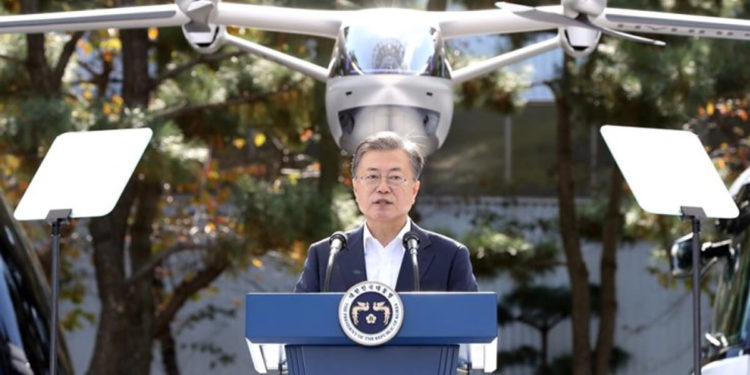South Korean President Moon Jae-in inspected Hyundai Motor‘s Ulsan plant on Friday to look into its future automobile production facilities and highlighting the government’s strong support to promote future eco-friendly cars in line with the Korean New Deal initiative. The President reaffirmed that the government would strengthen Korea’s authority in the future mobility industry for the next five years.
Chung Euisun, Hyundai Motor Group Chairman, accompanied President Moon along with Deputy Prime Minister Hong Nam-ki and the ministers of industry, environment, and transportation.
Moon reassured the government’s effort to inject more than 20 trillion won (US$17 billion) hydrogen and electric vehicles (EVs) and other green initiatives. He also stated that this investment signals the country’s bold response in the rapidly changing global auto market.
The President repeated that the country intends to produce 1.13 million (EVs) and 200,000 hydrogen fuel cell EVs by 2025. The nation plans to export 530,000 EVs and hydrogen vehicles, develop local battery makers, and commercialize level 4 self-driving vehicles.
President Moon commended Hyundai Motors and Ulsan city’s hard work for leading the nation in the future of hydrogen mobility.
During the tour, Moon mentioned that while other automakers focused on EVs, Hyundai boldly ventured into hydrogen cars along with EVs. Hyundai’s bold move created the first hydrogen car worldwide and currently achieved the top spot in sales.
Korean New Deal Policy
The Korean New Deal initiative policy enjoins the eco-friendly mobility industry in driving growth to the country’s economy. Moon’s visit to Hyundai Motor’s manufacturing facility came after the initiative policy announcement in July.
Under the policy package, the government would increase EV charging facilities to 500,000 from 59,000 stations. The policy would also include an increase in parking spaces with charging stations to five percent. The government also intends to set up 450 hydrogen filling stations in Seoul and Gyeonggi Province by 2025.
Starting next year, all government and public institutions would only purchase EVs or hydrogen EVs. The government also expects the private sector to increase the EV and hydrogen EV penetration rate.
Presently, 400 Korean companies produce components for either autonomous or eco-friendly vehicles, making only four percent of the country’s automakers. The government intends to raise the number of auto parts makers to 1,000 by 2030 through its support.
After the ceremony, Moon inspected the future cars displayed inside and outside the facility with the ministers and Hyundai’s chairman.







